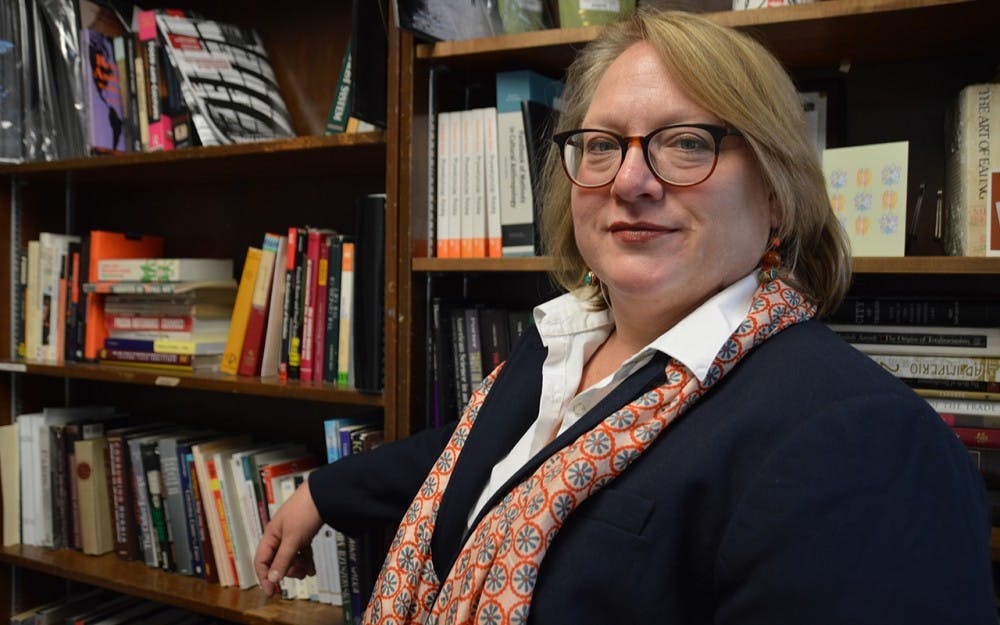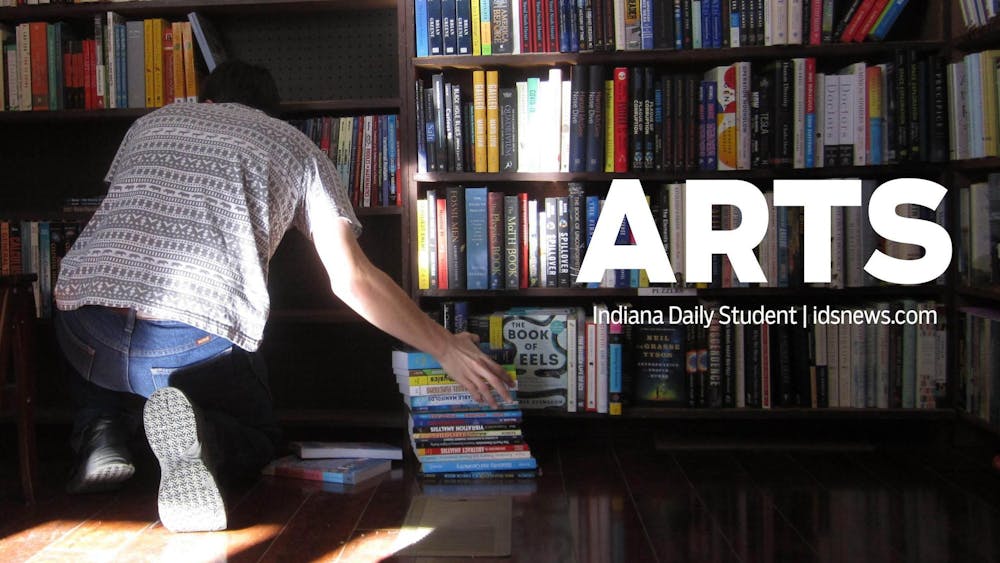Anyone peering in from an Indiana Memorial Union window Sept. 28 could have seen professor Elizabeth Cullen Dunn dancing.
On her way to a talk, she received word that the Department of State had approved Bloomington as a resettlement site for about 60 Syrian and Congolese refugees in the middle of a state where the governor attempted to ban those very people.
She called fellow members of the Bloomington Refugee Support Network and sent a Canvas message to students in her I304: Refugees and Displaced People service-learning class.
“We are now moving into Phase II — getting ready for our new neighbors to arrive!” the message read. “Your help will be so important as we get ready.”
Her inbox exploded, and she never made it to the talk.
That day was like redemption, the chance to do something she has wanted so badly for more than a decade. With the help of her students and the community, she can make a difference.
***
Earlier this year, Dunn invited students in the I304: Refugees and Displaced People class to interrogate her on her published research.
Switching a shiny ring from finger to finger in the sunny Global and International Studies Building, she first asked for a round of silly questions, ice breakers.
Perhaps: What did you eat in the postwar Georgian displacement camp where you lived? The answer is pasta and cabbage, which she said she’ll never consume again.
How did you spend your Fulbright Fellowship? The answer is she gave it all away to charity.
How does your fieldwork affect you today? The answer is witnessing such suffering brutalized her, and she, screaming, still occasionally bolts upright in bed.
The students didn’t raise those questions. No, this was the crew that had already set up a website and Facebook page promoting resettlement and made brochures with facts from the state department and PowerPoint presentations to teach local congregations and neighborhood associations about the expected community members. This was the crew that had already raised $10,000 to open the city Exodus Refugee Immigration Inc. office.
A girl asked about a reference to German sociologist Max Weber.
“That’s not silly, and you’re going to have to work harder at being stupid,” Dunn said.
She clutched a cup from the the Coffee Bean. Having flown in from a Colorado hiking trip just after midnight, she needed that coffee to get her through the 9:30 a.m. class.
On to the real questions in groups of three.
The class was 90 percent female, and she wanted their hardball questions.
“Women very often are afraid of asking hard questions because they don’t want to seem like, you know,” she paused and then finished emphatically, “bitches.”
The class gave a hearty chuckle.
“If you have a choice between being a fluffy bunny or being a bitch — ” she began.
The class applauded before she could finish.
***
A few days later, just before the last Bloomington Refugee Support Network meeting, Dunn’s adopted cats, Omar, Zorro and Squid — just three of the creatures Dunn has given refuge — lazed about her home.
It was the red brick home where 5 a.m. pulls her out of bed and where she works for a while before her adopted son, Aaron — one of 15 foster children Dunn has housed through the years — wakes up.
It was the place to which she returns after taking Aaron to school, eight hours of classes and meetings and trying to make it to the gym.
It was where she chats with her son while making dinner, supervises his homework and finally gets to her own work — grading and planning and editing her book, which the publisher wants by the end of the year.
Finally she melts in front of the television. Sometimes she falls asleep fully dressed with all the lights on.
It was not that time yet, and Dunn had a meeting to attend. Aaron asked if she would pack her recurve bow to the library for protection from the Grassroots Conservatives. She did not.
They are not bad people, she said. They are just afraid, and that fear will dissipate when the new neighbors join the community, she said.
***
Dunn, bright blue eyes behind subtle brown glasses, scanned the meeting room.
Three Bloomington Police Department officers skirted the walls. Any woman in a cotton dress or man in a pastel polo could throw the first punch and launch another scuffle, like the one that rocked a similar forum on refugee resettlement the month before. The adversaries’ nametags did not identify them as Grassroots Conservatives, but generally that’s what they were.
One of Dunn’s students, Courtney Veneri, shifted her slim frame from left to right at the head of the room. She had just slipped in from helping a classmate collect names and emails from those entering the night’s resource meeting and forum.
Diane Legomsky, the chair of the support network, clasped her hands. She had first approached Dunn just after the Paris bombings to explain how she and others at Congregation Beth Shalom had formed a committee to help refugees. They wanted her help.
Legomsky instructed the audience to divide into its preferred subcommittees, marked by massive sheets of paper stuck to the walls. Bodies wormed around each other like goop in a lava lamp and eventually settled. Dunn buzzed toward the table dedicated to community education.
Before Dunn could sit, she had been nominated the committee chair.
Dunn’s students and members of her Wednesday morning refugee-focused reading group gravitated toward the table. Reverends and city government workers and grandparents piled on.
“Have you considered media outreach at all?” Media School professor Elaine Monaghan said.
It had all been management by winging it, Dunn said, so a subcommittee devoted to media would be helpful.
“How are you defining education?” shouted another woman.
“Loosely,” Dunn said.
“What can I do?” School of Education grant writer Cate Racek said.
Dunn described how Exodus, which serves refugees internationally, needs $70,000 to open a Bloomington office. The number fell like an anvil.
A man named Terry cupped his ears, squinted and leaned his long torso over the table in her direction. A woman named Purnima, short arms crossed, piped up from behind.
One by one, Dunn defused each bomb before it landed. Within minutes, the education subcommittees had divided into sub-subcommittees.
As the library clock ticked 8:15 p.m., community members opposing refugee resettlement, who had been asked to leave until the forum portion of the night, hunkered into plastic chairs.
Veneri and Dunn stood inches apart to hear one another. The student said she would have to time people’s questions and comments, and she would have to cut them off at one minute. She was nervous.
Dunn reminded her of the choice between fluffy bunny and bitch.
“Now is your moment to shine,” Dunn said. “Do not let the microphone out of our hands. Listen to my words. Do not let it go.”
Veneri promised she would keep it under control.
“Let me get a drink of water before all hell breaks loose,” Dunn called as she slid away.
Exhausted, Dunn asked a librarian where to find a water fountain. With a parched mouth, she said refugees are her life now. She searched most of the second floor, asked a man at the information desk, searched a while longer and finally got her drink.
Returning, she squeezed between journalists to get through the door and took her seat toward the front of the room.
Following a brief introduction and rules by Legomsky, hands shot into the air. A man wearing a black-and-pink “Defund Planned Parenthood” shirt spoke first.
He asked how Exodus had vetted the refugees differently from the European Union. He asked for a 100-percent guarantee that members of ISIS would not infiltrate Bloomington.
As Exodus’s executive director discussed the rigorous screening process endured by all refugees entering the United States, Dunn whispered to Legomsky and reached out to tug on her shirt. She missed and settled on leaning into the table and gripping the edge of her chair. She could not sit there on a fluffy white tail.
She chipped in, cited the Cato Institute and explained the odds of anyone being involved in a refugee-led terrorist attack is one in 3.64 billion — 11 times less likely than death by falling furniture. There was truth, packaged with a passion for education and a dedication to helping all creatures find refuge, inside her.
She, Legomsky, Veneri and others systematically dismantled concern after concern by presenting statistics and personal experience, but fears of Muslims and diversity just kept flowing.
One woman, her body cockeyed like a frozen marionette, focused on Veneri.
“What we would possibly find with Sharia law, if it was allowed, are enclaves, which we might call ghettos, for Muslims,” the woman said as Dunn whipped her head in Legomsky’s direction. “Then, if they did stone a woman for a non-witnessed rape, we would go and get those guys in trouble, as Americans? Are you saying that’s OK with us?”
The Exodus director stepped in on the line that all people would be held to the same standards in U.S. courts. He fought to keep the woman from speaking over him. Dunn slid her rings around and chewed on a thumb nail.
“But if they make a judgment, which is in Sharia law, and they carry out the judgment, the poor girl’s already dead,” said the woman, shifting from hip to hip. Dunn grimaced.
Legomsky, outlining Orthodox Judaism’s local courts, which exemplify how faiths can fit within the framework of U.S. law, cut in. Dunn pulled herself closer to the table and leaned to make eye contact with her latest interrogator.
“But what happens now?” the woman asked. “We have many young men that have been Americans, and they are the ones that have become the terrorists.”
She called for a response from Dunn, whose eyes bore into the woman.
“Does that support what you’re saying?” the woman asked. “That these children that are assimilated so easily will for sure grow up to be just American kids?”
Dunn threw her hands at the ceiling and flung them about as she spoke. This was a softball question.
There are millions of immigrant Muslims in this country and three have committed violent acts, she said. In the same time span, many, many non-Muslims have done the same. Dunn erupted from her chair.
“No one can tell you 100 percent that nothing will ever happen in the future, but I can tell about you. You are less well-vetted than any refugee coming into this country,” she continued.
Applause drowned out the rest of her words.
The woman attempted a retort, but Veneri cut her off.
“Your minute is up. Your minute is up now.”
Dunn fell back into her seat.
A woman in long braids and a man who towered a foot over Dunn congratulated her on a point well-made.
A member of the refugee-focused reading group Dunn hopes is the beginning of Refugee Studies at IU gave her that pat on the back.
“I blew it,” Dunn said. “Again.”
Engaging with the woman had been a mistake, she said.
“I will get better at this,” Dunn said. “I will get better at this.”
Most of the crowd made its way out the door.
Alone for the first time that evening, Dunn stood in the middle of the room. She spun just slightly, searching for who, for where, for what was next.
She never imagined it would be Donald Trump and Mike Pence — the governor who attempted to ban Syrian refugees — winning the election.
***
This class she had to ask the questions.
“What will this mean for refugees? What will this mean for the families we are working to bring to Bloomington?”






